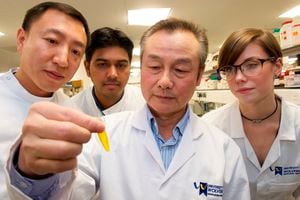Wolverhampton professors need city's help to fund life-saving pancreatic cancer research
University professors on the hunt for new cancer treatments are calling on the city to dig deep into their pockets.

The University of Wolverhampton is supporting two national initiative's raising cash to fund new treatments for pancreatic cancer.
It is urging the city's residents to unite behind the cash-gathering schemes to continue life-saving pancreatic cancer research.
University researcher Professor Weiguang Wang was awarded more than £73,000 by Pancreatic Cancer UK to look into treating the cancer using Disulfiram - a drug used to treat alcoholism.
He said: "We’re very pleased our research was chosen for funding and that we have been able to continue our work with Disulfiram and test its effectiveness in treating pancreatic cancer.
"Current treatment options for pancreatic cancer are limited, and most patients diagnosed with the disease have a poor prognosis.
"This is an extremely promising area of investigation and if we’re successful, could lead to new options to improve outcomes for people with pancreatic cancer."
Pancreatic cancer is the 11th most common cancer in the country, with more than 800 people diagnosed in the West Midlands every year.
The university is backing November's Pancreatic Cancer Awareness Month and national scheme Giving Tuesday, set to take place on November 28.
Giving Tuesday aims to encourage people to support good causes in their communities, with donations made to the university supporting Professor Wang's vital work.
He received the grant as part of Pancreatic Cancer UK's forth annual Research Innovation Fund (RIF) grants scheme.
Professor Wang added: "Survival has barely improved over the past 40 years with less than five per cent of people living beyond five years from diagnosis.
"It is estimated that by 2020 there will be more than 418,000 new cases around the world every year, with a global mortality rate of 1,000 people dying each day.
"Despite this, over the last decade only one per cent of the total UK cancer research spend has been dedicated to the disease."
The university said £10 donated could buy two 500ml formulations for cancer cell cultures, while £25 could purchase eight cell culture inserts used for examining the spread of cancer cells in a laboratory.
Residents donating £50 will allow 50 tissue culture dishes to be purchased, used for growing cultures in, while £100 would buy a box of x-ray film for detecting drug resistant genes.
For more information see wlv.ac.uk/research/giving-tuesday/





